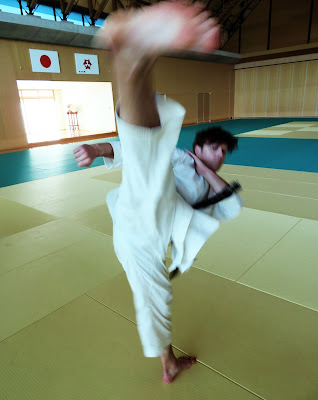This site is based on my daily practice of Shotokan Karate-Do here in Oita City, Japan. More than anything else, unlike the majority of other karate websites, this page is primarily dedicated to Budo Karate training itself; that is, Karate-Do as a vehicle for holistic development.
Monday 30 May 2022
Keeping it real: DAN EXAMS
Sunday 29 May 2022
Seehausen, Bavaria Seminar: Confirmed for July 16th/17th, 2022.
Wednesday 25 May 2022
Announcements to come regarding the resuming of International Seminars outside of Japan
Today my training was intense. Kihon was focused on the IKS Dan Examination ido-kihon. Also, the Joko series of kata from Asai Tetsuhiko Sensei, Hyakuhachiho (Hyakuhappo/Suparinpei), and Wankan. I practiced Wankan additionally due to one of my students wishing to do it soon for his Sandan exam.
It was a tough training today, but some announcements are about to be made about Germany. Stay tuned!
Sadly, here in Japan, exit and entry has been very strict. This has resulted in many complications; hence, the generic blockage of my travels outside of Japan. In the case of Bavaria, a contract has been agreed upon to cover the corona situation. So once we receive this, I will formally announce the seminar here on this site,
This seminar will not be a physically hard event. My objective is to pass on lots of knowledge and for everyone to enjoy practice and learning.
More information to come as soon as possible.
© André Bertel. Oita City, Japan (2022).
Wednesday 18 May 2022
能ある鷹は爪を隠す
Today's training comprised of lots of kihon, both sonoba kihon and ido kihon; also, kata, namely, Jiin and several koten-gata.
Overall, this practice was not a hard session but, more so, technically challenging.
能ある鷹は爪を隠す
Tuesday 10 May 2022
Today's training
 |
While I wont specifically detail my dojo training today, this session was just under two hours in duration. It wasn't a hard session but, more so, technically challenging for me. Best wishes from Oita City, Japan. - AB.
基本 (KIHON)
1. 中段直突 (Chudan choku zuki). Emphasis on 'gyaku koshi kaiten'.
2. 中段前蹴蹴上 (Chudan mae geri keage).
3. 上段追突 (Jodan oi zuki).
4. 三本突 (Sanbon zuki). All three tsuki 'jodan' targeting the jinchu.
5. 刻回し蹴 (Kizami mawashi geri). Primary focus on driving the hips and ankle snap.
6. 上段揚受 (Jodan age uke);
7. 中段外受 (Chudan soto uke)
8. 上段揚受から中段外受、下段払そして三本突 (Jodan age uke kara chudan soto uke, gedan barai soshite sanbon zuki). Note - again, all three tsuki targeted jodan).
型 (KATA)
A. 半月 (HANGETSU).
B. ニ十四歩 (NIJUSHIHO).
C. 珍手 (CHINTE).
Today Chinte was the main focus. That being said. I'm still also doing a general review of all of the kata separately. At present the focus is GOJUSHIHO SHO.
I. 基本一本組 (KIHON IPPON KUMITE). One step attack but with multiple waza.
II. 応用組手 (OYO KUMITE). For all kata I am practicing the applications in kumite.
By the way, some big announcements coming soon, once things are fully confirmed...
© André Bertel. Oita City, Japan (2022).
Monday 2 May 2022
拔塞小 (Bassai Sho), 観空小 (Kanku Sho) and 五十四歩小 (Gojushiho Sho).
Currently I am going through all of three of the standard Shotokan ‘SHO’ kata; namely, 拔塞小 (Bassai Sho), 観空小 (Kanku Sho) and 五十四歩小 (Gojushiho Sho).
Thus far I’m still going through the first two, but will
probably get to Gojushiho within the next few days of training. As everyone knows, I'm a `Gojushiho Dai guy', as Sho doesn't suit my body; nevertheless I wish it did, as it is an epic kata.
Taken as whole, I’m taking extensive time practicing each
action, and breaking them down into minute detail. In this way, say, Bassai Sho
can be thought of as 27 ‘kata’, with three more kata within each of these;
thus, containing 81 ‘miniature kata’. These three are: (a) the initial
position; (b) the winding up/chambering; and (c) the execution/completion.
Indeed, one can break this down even further, however, doing
so reduces results as it often
interferes when the kata is executed properly, with rhythmical flow between
transitions, actions and positions. With that point in mind, it is indeed most imperative to mostly practice kata as a whole (more so, than broken down); furthermore, practicing individual waza and renzokuwaza during impact training, and in kumite flow drills with a training partner.
On a personal note, after 30 plus years of doing these kata I still find it exciting to continue learning from them. Much more inspiring, than this, is that I have seniors with 50 plus years who say the same thing. So I stand under the shadow of mountains.
In addition to these kata, I am still engaged in an intensive strength and power training regime; furthermore, maintaining my usual cardio work. These routines involve alternate days of lifting lots of plates around in the gym, and mountain/hill running.
To avoid damaging my technical training, my typical day
involves “...doing karate first and concluding with strength or fitness
work”. That being said, after going for my run I often conclude with some kihon
and/or kata to review my indoor (dojo) training. The photo above was after my run today. I know of some people who can do things the other way around, I admire that, but I'm not one of them. My point here is that "...each individual must work out a training regime which optimizes their personal development".
All the very best from Oita,
押忍
André
© André Bertel. Oita City, Japan (2022).








